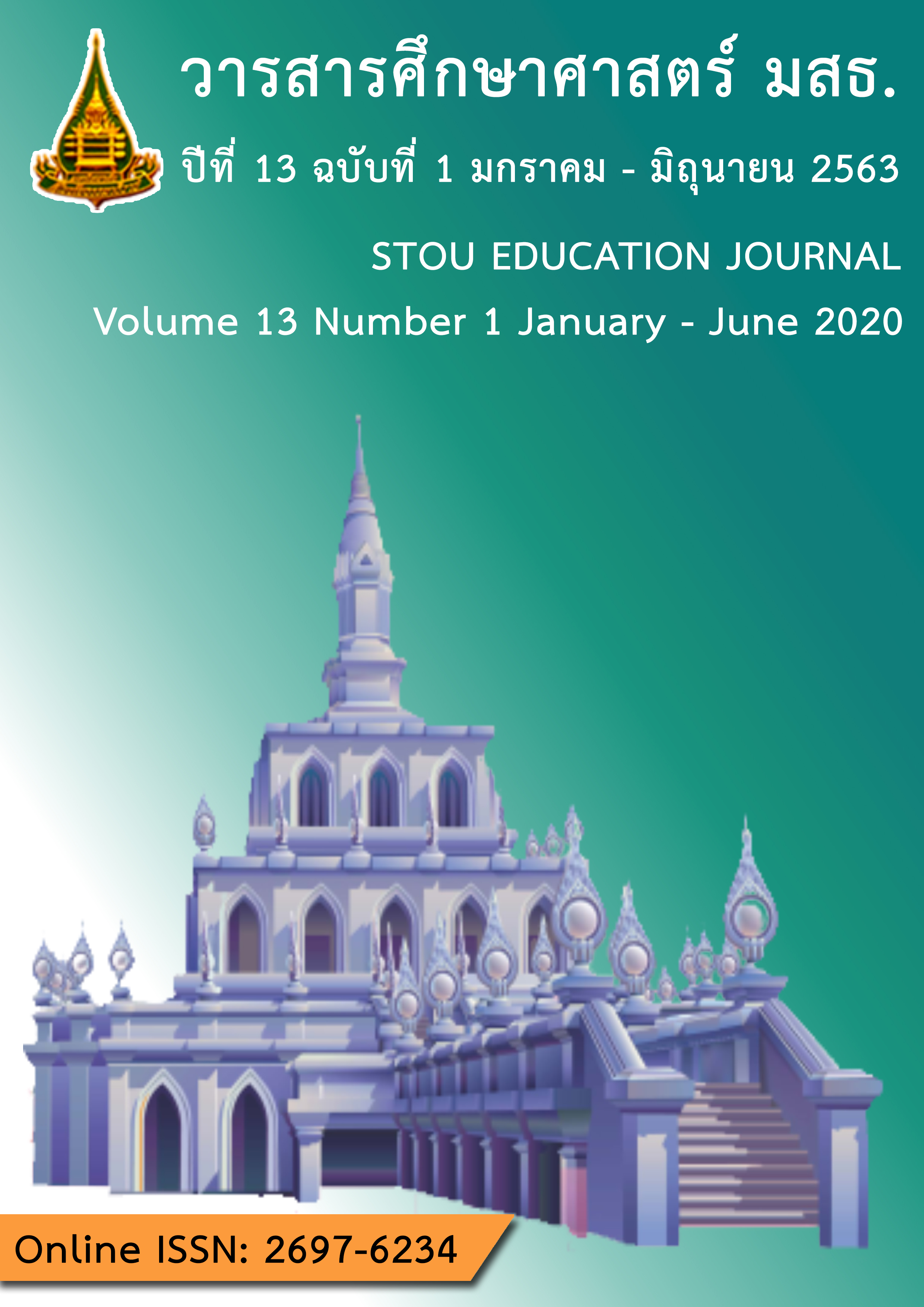How Do Students Value the Importance of Skills Needed in the Digital Age? A Preliminary Study Using MDS and MDU Analyses
Main Article Content
Abstract
21st century skills are important for personnel preparation. However, the frameworks of the foresaid skills that scholars stipulated are broad and varied with the perspectives of those giving the definitions. In today’s advanced world, some skills are more importance and needed to be more focused than others. For these reasons, the purpose of this research was to study how students value the importance of skills needed in the digital age and their perspectives on which skills should receive priority concerns. In this research, data were collected from 139 public and private university students, including undergraduate, master’s, and doctoral students. The research instruments were questionnaires in two different forms: comparison and ranking order. Data were analyzed by using MDS and MDU analysis in grouping the participants’ opinions. Furthermore, this research compared the results of using two data collection methods to determine which method would yield more appropriate results. The findings showed that both methods yielded similar and also different grouping results of skills needed in the digital age. The MDS analysis was found to be more fit for the data collected from a ranking order questionnaire, whereas the MDU analysis was more fit for the data collected from a comparison questionnaire.
Article Details
References
ถนอมพร เลาหจรัสแสง. (2559). การเรียนรู้ในยุคสมัยหน้า: ตอนอนาคตครูไทยครูพันธุ์ C. สืบค้นจาก http://thanompo.edu.cmu.ac.th/load/journal/50-51/Cteachers.pdf
ประกาศกระทรวงศึกษาธิการ. (2558). เกณฑ์มาตรฐานหลักสูตรระดับบัณฑิตศึกษา. สืบค้นจาก http://www.mua.go.th/users/bhes/front_home/criterion58/criterion%20_m58.PDF
ไพโรจน์ นวลนุ่ม. (2561). การประยุกต์ใช้การวิเคราะห์ตามลำดับชั้นในการวิเคราะห์ปัจจัยที่ส่งผลต่อการตัดสินใจปลูกข้าวพันธุ์พื้นเมือง กรณีศึกษาในเขตตำบลขนาบนาก อำเภอปากพนัง จังหวัดนครศรีธรรมราช. WMS Journal of Management Walailak University, 7(Special issue), 27-42.
มยุรฉัตร นพกรสุขทองดี และ อัจศรา ประเสริฐสิน. (2560). การประเมินความต้องการจำเป็นเพื่อพัฒนาการจัดการตนเองของนิสิตระดับปริญญาตรีหลักสูตรการศึกษาบัณฑิต มหาวิทยาลัย ศรีนครินทรวิโรฒ. วารสารบรรณศาสตร์ มศว, 10(2), 120-133.
สังวรณ์ งัดกระโทก. (2562). Multidimensional scaling and multidimensional unfolding เอกสารประกอบการบรรยายในรายวิชา ทฤษฎีการวัดทางจิตวิทยา 2757847 คณะครุศาสตร์ จุฬาลงกรณ์มหาวิทยาลัย. กรุงเทพฯ: เอกสารอัดสำเนา.
Alt, D. (2016). Using structural equation modeling and multidimensional scaling to assess female college students’ academic adjustment as a function of perceived parenting styles. Current Psychology, 35(4), 549-561.
Ananiadou, K., & Claro, M. (2009). 21st century skills and competences for new millennium learners in OECD countries. Retrieved from http://hdl.handle.net/123456789/2529
Bloomberg. (2015). The bloomberg recruiter report: Job skills companies want but can’t get. Retrieved from https://www.bloomberg.com/graphics/2015-job-skills-report/
Bridgstock, R. (2009). The graduate attributes we’ve overlooked: Enhancing graduate employability through career management skills. Higher Education Research & Development, 28(1), 31-44.
Costa, R., Fonseca, J., Kullberg, J., Martins, N., & Santana, F. (2015, September). Soft skills for science and technology students. Paper presented at the 2015 International Conference on Interactive Collaborative Learning (ICL). doi.10.1109/ICL.2015.7318206
DeVellis, R. F. (2017). Scale development: Theory and application (4th ed.). Thousand Oaks, California: Sage Publications.
Frot, M. (2017). 7 essential skills every graduate needs in 2017. Retrieved from https://www.topuniversities.com/student-info/careers-advice/7-essential-skills-every-graduate-needs-2017
Gilbert, K., Pedhazur Schmelkin, L., Levine, N., & Silva, R. (2011). A multidimensional scaling analysis of perceptions of academic dishonesty among fifth-grade students. Ethics & Behavior, 21(6), 471-480.
Jamieson, K. G., & Nowak, R. (2011, December). Active ranking using pairwise comparisons. Paper presented at the 24th International Conference on Neural Information Processing Systems. https://dl.acm.org/doi/10.5555/2986459.2986709
Jaworska, N., & Chupetlovska-Anastasova, A. (2009). A review of multidimensional scaling (MDS) and its utility in various psychological domains. Tutorials in Quantitative Methods for Psychology, 5(1), 1-10.
Kavanagh, M. H., & Drennan, L. (2008). What skills and attributes does an accounting graduate need? Evidence from student perceptions and employer expectations. Accounting & Finance, 48(2), 279-300.
Kruskal, J. B. (1964). Multidimensional scaling by optimizing goodness of fit to a nonmetric hypothesis. Psychometrika, 29(1), 1-27.
Laari, L., & Dube, B. M. (2017). Nursing students' perceptions of soft skills training in Ghana. Curationis, 40(1), 1-5.
Mair, P., Borg, I., & Rusch, T. (2016). Goodness-of-fit assessment in multidimensional scaling and unfolding. Multivariate behavioral research, 51(6), 772-789.
Martins, A., Cardoso, M. & Pinto, I. (2009). Multidimensional unfolding and the use of alternative input scales. Journal of Targeting, Measurement and Analysis for Marketing, 17(3), 195 - 204.
Martins, A. A. A.F., & Cardoso, M.G.M.S. (2010). Picturing agreement between clustering solutions using multidimensional unfolding: An application to greenhouse gas emissions data. Journal of the Operational Research Society, 71(2), 1-14.
Mugavin, M. E. (2008). Multidimensional scaling: A brief overview. Nursing Research, 57(1), 64-68.
Pereira, O. P., & Costa, C. A. A. T. (2017). The importance of soft skills in the university academic curriculum: The perceptions of the students in the new society of knowledge. International Journal of Business and Social Research, 7(3), 25-34.
Rodgers, J. L. (1991). Matrix and stimulus sample sizes in the weighted MDS model: Empirical metric recovery functions. Applied psychological measurement, 15(1), 71-77.
Wu, H. (2016, March). The study of influence of internet culture on ideological education of college students. Paper presented at the International Conference on Education, Sports, Arts and Management Engineering (ICESAME 2016). https://doi.org/10.2991/icesame-16.2016.139


